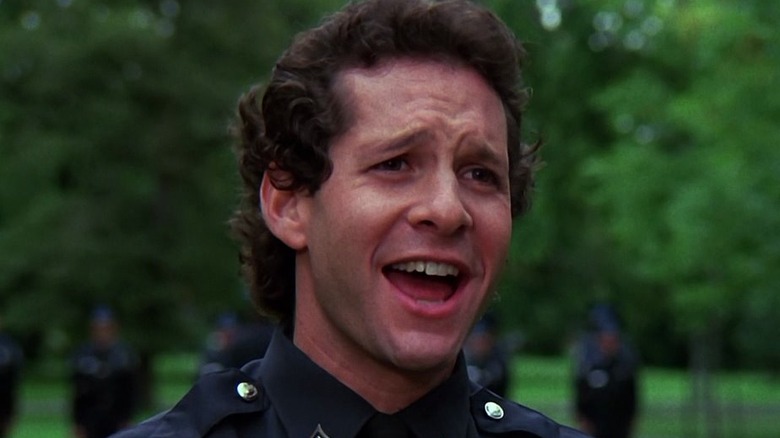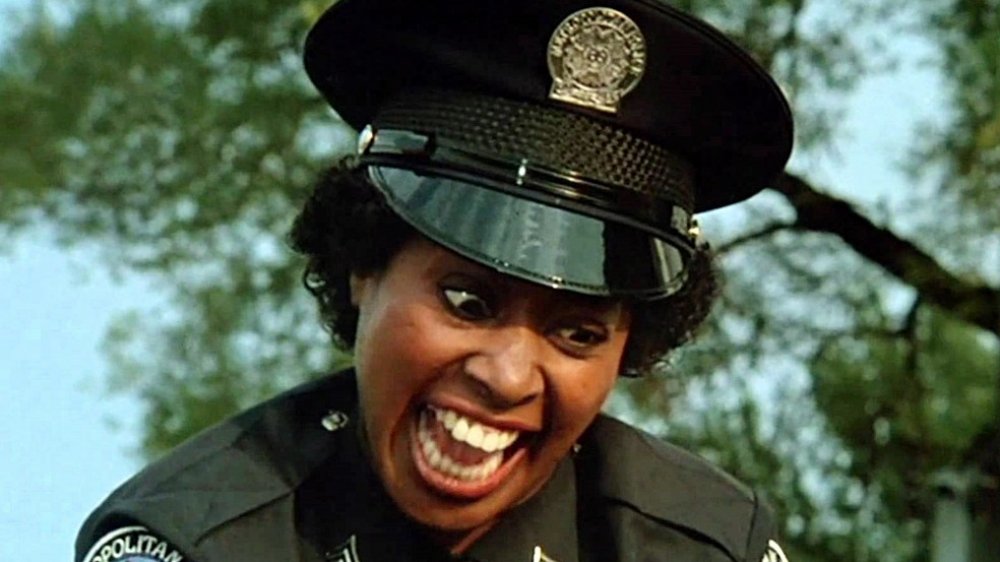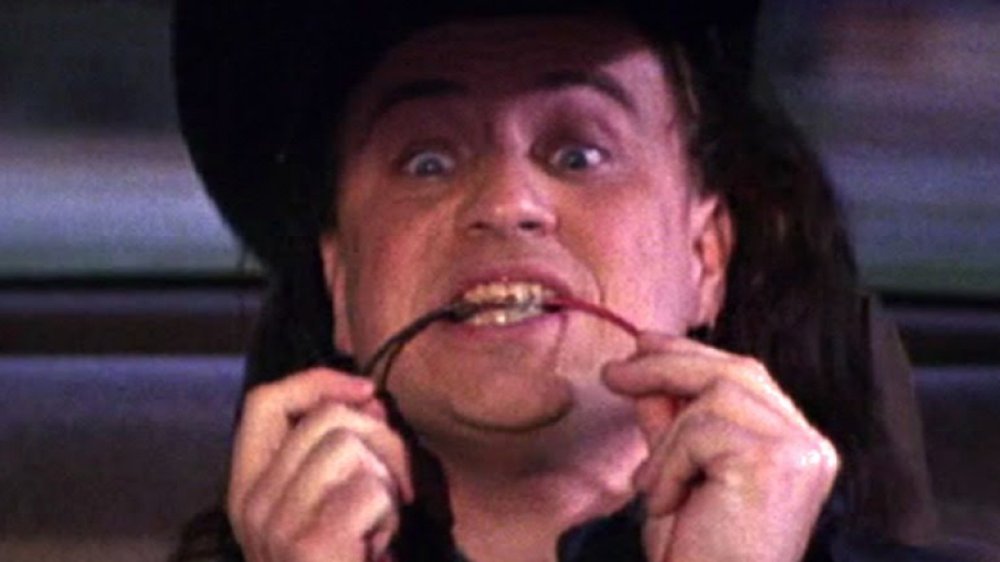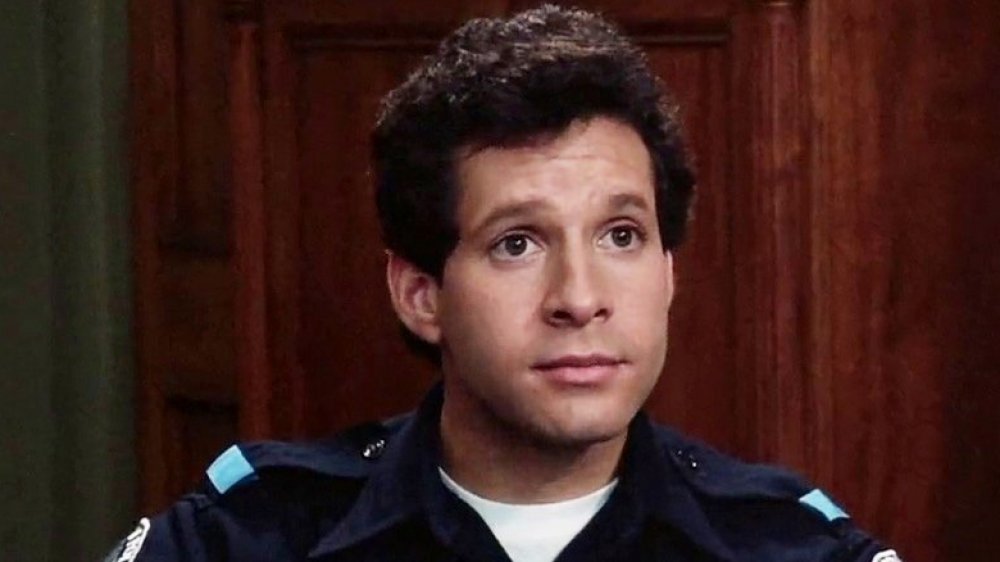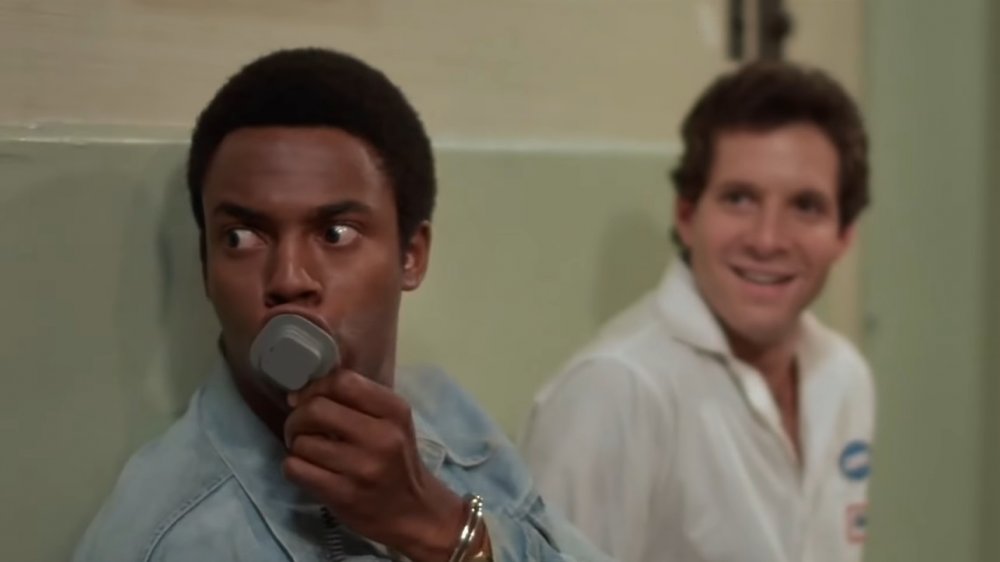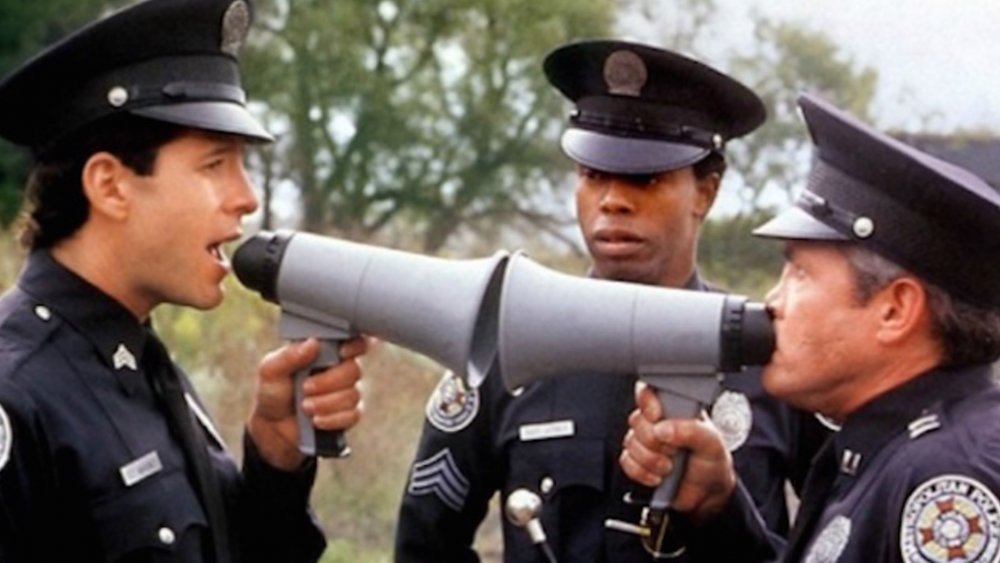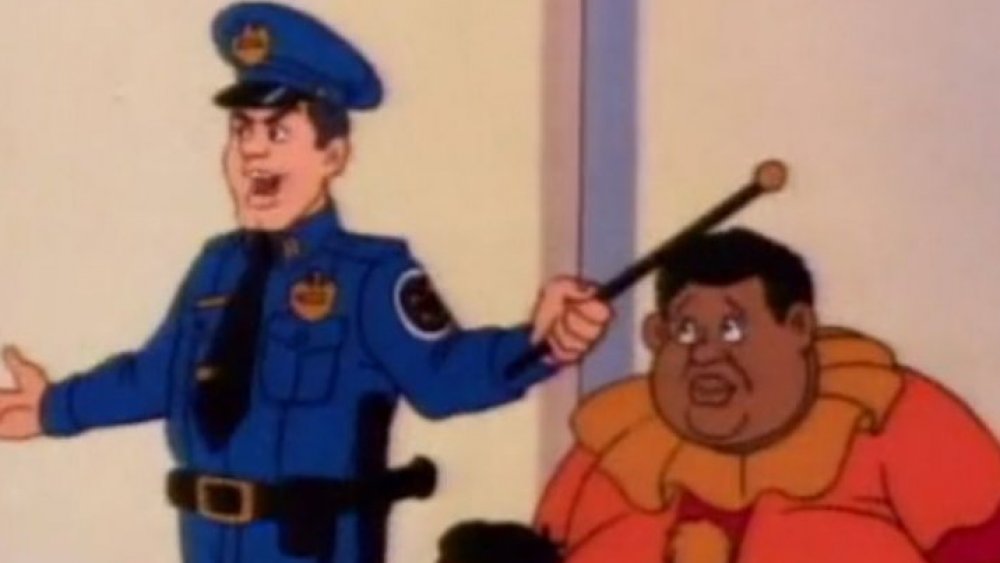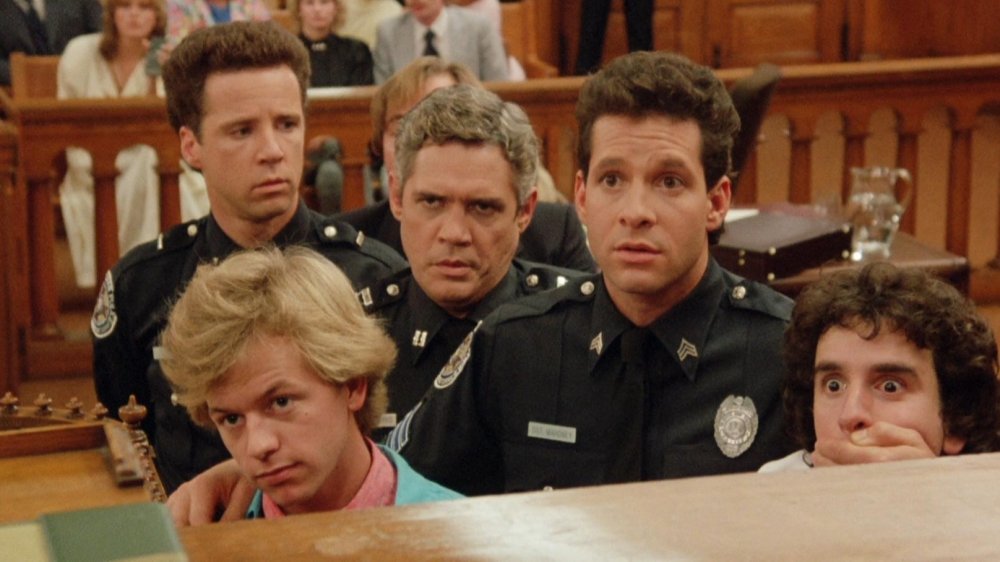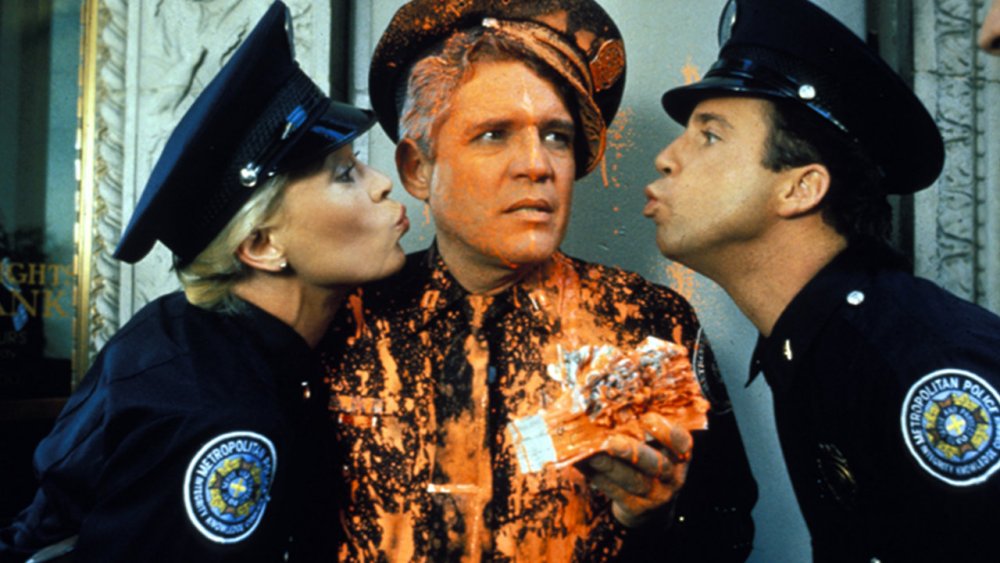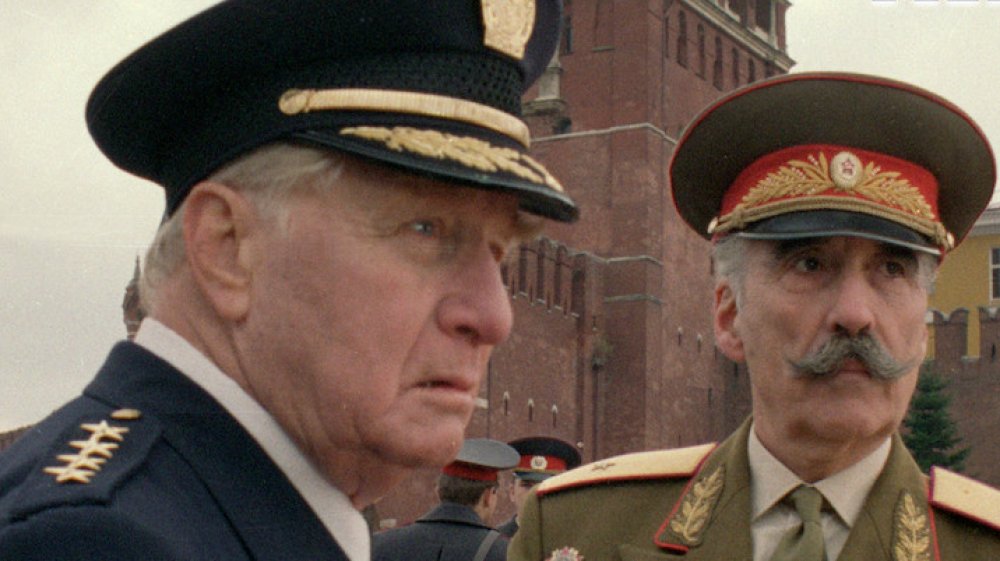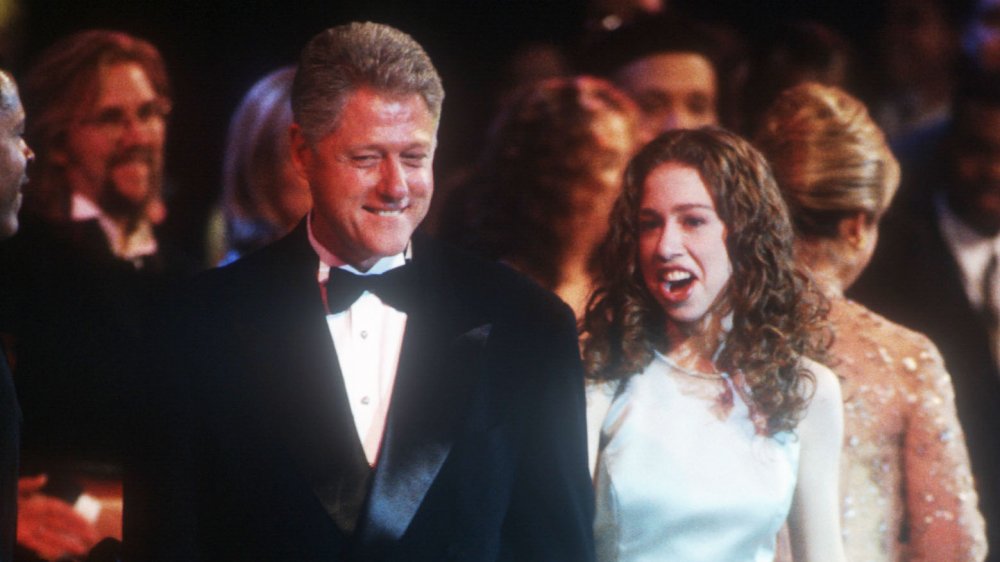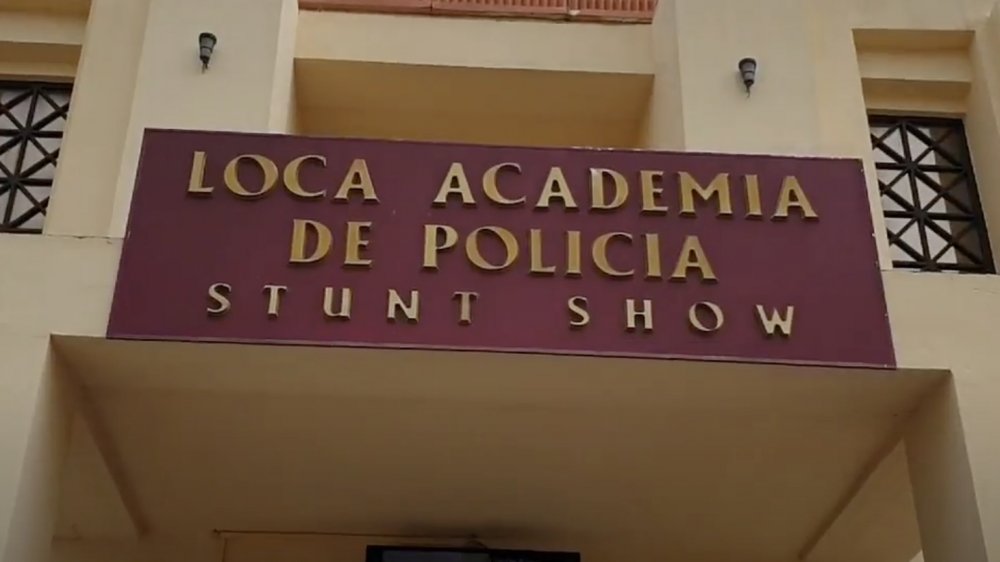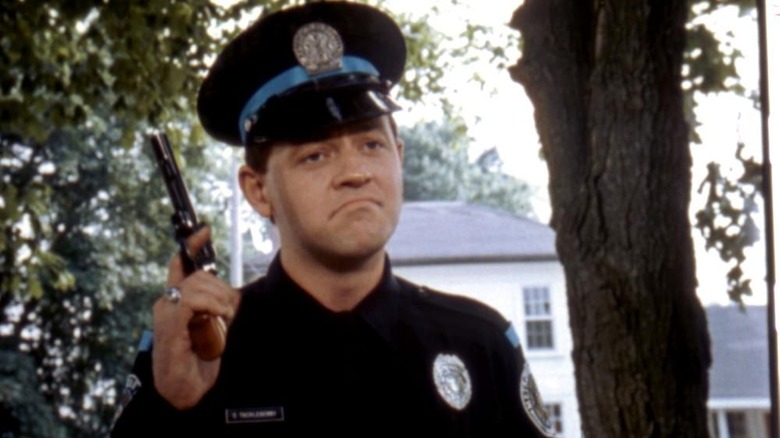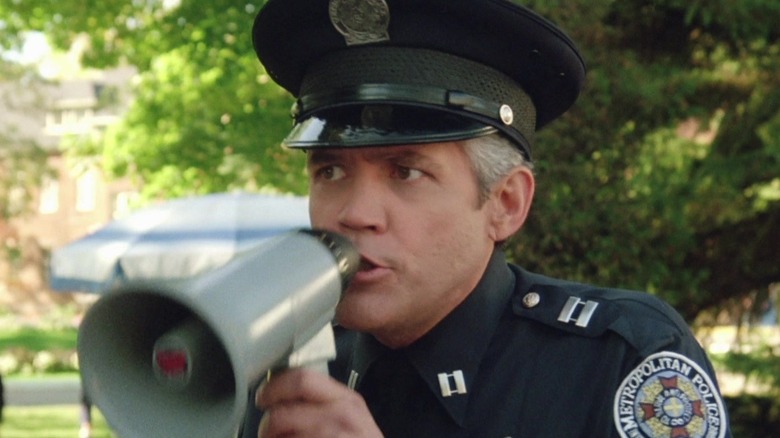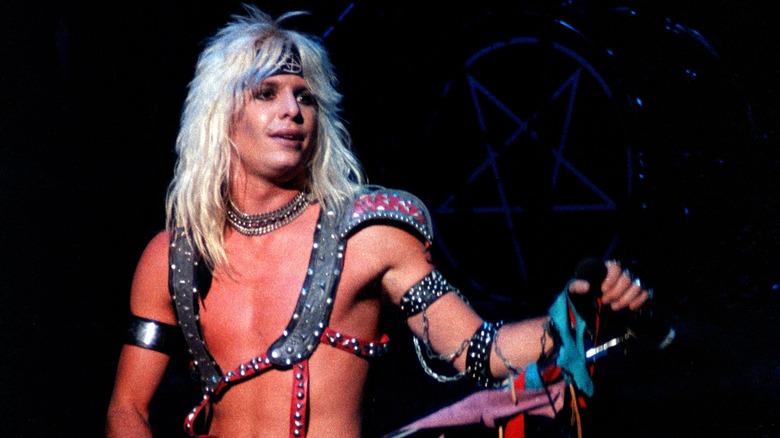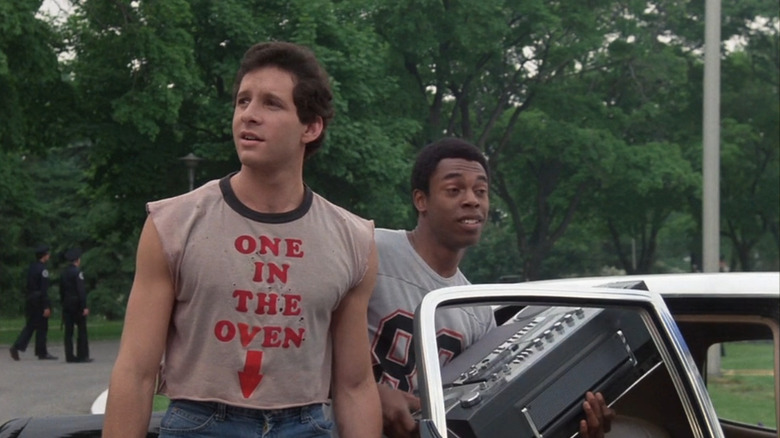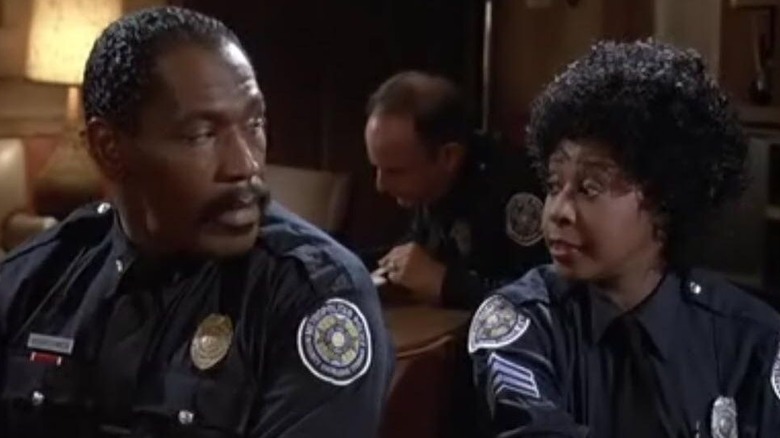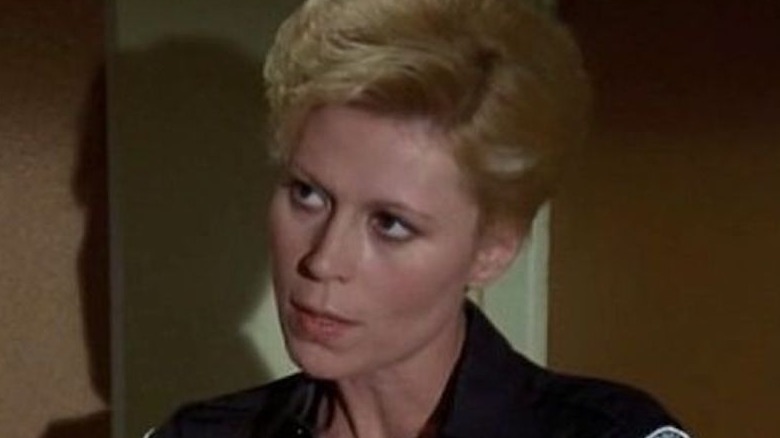The Untold Truth Of Police Academy
Throughout the 1980s and into the early 1990s, filmgoers could count on the police — well, "Police Academy" that is. The seemingly indefatigable franchise churned out seven movies with impressive regularity. Were they low-budget and predictable with one-note characters and predictable plots? Absolutely. But were "Police Academy," "Police Academy 2: Their First Assignment," "Police Academy 3: Back in Training," "Police Academy 4: Citizens on Patrol," and the others also delightfully brash, gross, over-the-top, tawdry, and hilarious? Yes, they were.
With its stories about inept, preoccupied, unqualified, unsuited, and downright bonkers officers of the law, the franchise made the police look just slightly better than the criminals, but the "Police Academy" movies were mostly just about having a silly, good time for 90 minutes and exposing the world to the talents of Steve Guttenberg (Carey Mahoney), Bobcat Goldthwait (Zed), "SNL" star Tim Kazurinsky (Carl Sweetchuck), former NFL star Bubba Smith (Moses Hightower), and David Graf (Eugene Tackleberry).
In the modern reality of franchises, the "Police Academy" filmmakers were pioneers in building cinematic universes. Here's a look behind the badge and into the world of "Police Academy."
Police Academy is based on a true story
The premise of "Police Academy" is that a big city is in such short supply of law enforcement officers that it offers the opportunity to carry a badge to virtually anyone. That results in a police academy full of recruits that don't seem like they'd ordinarily be cops — from elderly people and goof-offs to tiny people, very large people, and those with obvious psychological problems. This idea, a ragtag crew overcoming the odds to achieve a common goal, is a hallmark of '80s movies, and yet "Police Academy" wasn't inspired by its peers. Instead, it was inspired by reality.
"When I was up in San Francisco for the filming of location footage for 'The Right Stuff,' I noticed a bunch of ludicrous looking police cadets being dressed down by a frustrated sergeant," "Police Academy" producer Paul Maslansky told the Los Angeles Times. "They were an unbelievable bunch, including a lady who must have weighed over 200 pounds and a flabby man of well over 50. I asked the sergeant about them, and he explained that the mayor had ordered the department to accept a broad spectrum for the academy." The sergeant said the local police were forced to accept the cadets, and then slowly weed them out and release them before they actually became officers. That gave Maslansky his idea — what if those unlikely cops actually became cops?
The studio wanted an even more formula-driven movie
Producer Paul Maslansky sold the "Police Academy" concept to producers at The Ladd Company, while journeyman TV writers Neal Israel and Pat Proft were tasked with making the screenplay, and the two looked to tried-and-true comedy formulas to come up with a script they knew would work. "It's a matter of 'block comedy scenes,'" Israel told the Los Angeles Times, referring to broadly funny set pieces like the farting-around-the-campfire moment in "Blazing Saddles." "If you have four or five of these block comedy scenes," he added, "you have a hit."
In the mid-1980s "slob movies" were all the rage — juvenile, puerile stuff like "Animal House," "Porky's," and "Bachelor Party" (which Israel and Proft also wrote). That's what Ladd Company executives expected when they agreed to finance "Police Academy," but after seeing the final cut of the film, they expressed worry to the filmmakers that the movie didn't have enough fart jokes or sexual content. Their worries were unfounded. According to the L.A. Times, "Police Academy" was a hit, grossing $150 million worldwide.
Steve Guttenberg was cast over some A-list stars
In the mid-1980s, the moviegoing public first fell in love with a number of enduring male movie stars who are still popular today. We're talking about above-the-title marquee names like Tom Hanks and Michael Keaton, for example. And yet they all lost out on the starring role in "Police Academy," that of affable slacker/prankster-turned-second generation police officer Carey Mahoney, to another actor — Steve Guttenberg.
While Guttenberg's A-list career didn't last much beyond the '80s, he was a huge draw in that decade, thanks in part to his work in the first four "Police Academy" films, along with "Short Circuit," "Cocoon," and "Three Men and a Baby." It's unlikely those roles would've come had "Police Academy" filmmakers landed any of their first few choices: Hanks, Keaton, or "Fast Times at Ridgemont High" standout Judge Reinhold. Bruce Willis was up for the part, too, and along with "Moonlighting" (where he wound up), "Police Academy" was one of his first professional auditions.
Michael Winslow's character was created just for him
"Police Academy" movies are cast-driven, with actors delivering broad, funny takes on their characters and exploiting their most dominant and comedic traits. David Graf's Sgt. Tackleberry had a fixation on guns, for example, while Michael Winslow's Larvell Jones delivered a constant stream of uncannily realistic sound effects he made with only his mouth. However, that character wasn't actually part of the early drafts of the script for the first "Police Academy" film. Instead, he was added late in the pre-production process to suit Winslow, a comedian with a unique and dazzling talent for mimicry.
In early 1983, jazz legend Count Basie selected Winslow to be his opening act, and they both played the Long Beach Theater (outside Los Angeles). "Police Academy" producer Paul Maslansky and director Hugh Wilson were in the audience for one of those shows and were so impressed with Winslow that they approached him later that night and convinced him to be in the little ensemble police comedy they were making. Winslow told Rediscover the '80s that the two "gave me creative freedom, named me 'Larvell Jones,' and it was on."
The real reason there are so many Police Academy sequels
The name "Police Academy" has become synonymous with "unnecessary sequels." Like clockwork, about once a year throughout the '80s, Americans could count on another silly "Police Academy" movie hitting the local cineplex for a couple of weeks playing to mostly empty theaters. It was a collective cultural curiosity: Why did Hollywood keep making "Police Academy" movies if the sequels didn't perform well and the critics absolutely loathed them? It's because in the film industry, financial math isn't always about big bucks — it's about profit margins and relative success.
The first "Police Academy" movie, released in 1984, earned $81 million in North America, and it was the fifth highest-grossing title of the year, trailing the likes of "Ghostbusters," "Gremlins," and "Indiana Jones and the Temple of Doom." But unlike those movies, "Police Academy" didn't cost much to make, with a production budget of just $4.5 million. That's a tidy profit for producers, so they kept making "Police Academy" movies, and none were nearly as successful as the original. "Police Academy 2" took home $55 million, "Police Academy 3" made $43.5 million, and "Police Academy 4" earned $28 million. However, total grosses don't much matter because the film's relative low cost meant they still turned a profit.
There was more Police Academy beyond the movies
For what was initially just a slight, silly comedy movie about bumbling cops, "Police Academy" generated an awful lot of pop culture during its heyday, which didn't last all that long. The first six "Police Academy" movies hit theaters at a rate of one per year between 1984 and 1989, and they all became frequently rerun cable staples.
Plus, the wacky characters and zany humor made them very attractive to kids, despite the raunchy content that earned the first film an R rating. So naturally, Warner Bros. Television served young "Police Academy" fans with a 1988-89 syndicated animated series because kid shows based on R-rated movies used to be a thing. The films' main characters (Mahoney, Sweetchuck, Tackleberry) returned, but the movie stars were replaced with voice actors, and it led to all the requisite ephemera of an '80s animated series, including a tie-in comic book and a line of action figures.
In 1997, three years after "Police Academy: Mission to Moscow" bombed so hard it killed the big-screen franchise, "Police Academy" returned in the form of an hour-long syndicated comedy TV series. It ran for just one season, and it's notable only for Michael Winslow reprising his role as Larvell Jones.
A couple of big stars got their start in Police Academy 4
"Police Academy 4: Citizens on Patrol" was something of a soft reboot to the series, introducing new characters to the movies in the form of inept civilian volunteers in need of training by the formerly incompetent "Police Academy" gang. Not only were some of the actors new to the franchise, they were new to entertainment. "Citizens on Patrol" marks the film debut of future "Saturday Night Live" star David Spade as Kyle Rumford, a young criminal and skateboarder who avoids prison time by joining the pilot civilian police program.
Spade's stunt double for his skateboarding scenes, at least at first, was world-famous skateboarder Tony Hawk, still just a teenager and in his second-ever movie appearance. It was a collaboration and a gig that wouldn't last. "I ended up getting fired on 'Police Academy' because I was too tall," Hawk told The Chrome Ball Incident. "I didn't look enough like David Spade so they had to bring in Chris Miller."
Some comedy greats turned down the chance to make Police Academy 6
From 1984 to 1989, a "Police Academy" movie was released each and every spring, but then producers took a five-year break before unleashing the seventh and final film, "Police Academy: Mission to Moscow," to an indifferent world in 1994. That hiatus was primarily a retreat because the sixth "Police Academy" film, "City Under Siege," was such a flop — it earned $11.5 million at the box office — that it seemed like the franchise was out of gas.
But instead of being the last "Police Academy" movie for years, it could've been the film to reinvent the franchise. As it turns out, Ben Elton — a sketch comedian who wrote classic, edgy Britcoms like "The Young Ones" and "Black Adder" and often worked with "Four Weddings and Funeral" filmmaker Richard Curtis — told Metro that he was "hot enough to be offered" big commercial projects in the 1980s. "There are a lot of things I could have done for the money," Elton said, and evidently, one of those things was writing a screenplay for "Police Academy 6." However, he turned down the offer, and the film became a standard, stateside "Police Academy" jaunt.
Filming Police Academy 7 nearly caused an international incident
After the breakup of the Soviet Union in 1991, "Police Academy: Mission to Moscow" became the one of the first American movies to film in the formerly communist superpower. According to the Los Angeles Times, the cast and crew of the seventh and final entry in the "Police Academy" series filmed in Moscow for three weeks in late 1993 without incident or trouble ... until the post-Soviet power vacuum led to the military storming the Russian White House and TV Center.
During this period of violent unrest, "Mission to Moscow" temporarily shut down, and all 52 members of the cast and crew holed up in the government-owned Financial Academy Hotel. Unable to film an airport scene because of the military situation and subsequently declared state of emergency, the cast did what they needed to do at a hastily dressed studio. The situation improved enough for an outdoor shoot at a cemetery, although the filming coincided with burials of casualties of the unrest.
But then there's the time that Russian military officials rolled up on the film crew. According to "Mission to Moscow" DVD featurette "Underneath the Mission," Michael Winslow's wireless microphone picked up otherwise secret military communications, leading to a brief, tense, and ultimately smoothed-over standoff between the army and moviemakers.
Police Academy goes to the White House
As a major cultural force for the better part of a decade, "Police Academy" amassed plenty of fans, including such notable ones as President Bill Clinton. At the 2016 Democratic National Convention, the former commander-in-chief gave a speech in praise of the party's nominee, Secretary of State Hillary Clinton, and provided a glimpse into their home life as parents of their only child, Chelsea. "The truth is we rarely disagreed on parenting, although she did believe that I had gone a little over the top when I took a couple of days off with Chelsea to watch all six 'Police Academy' moves back to back," Clinton said (via Time). Chelsea Clinton corroborated her father's love of "Police Academy" in her own speech, noting, "Dad, as all of you now know, liked 'Police Academy.'"
This Bill Clinton fun fact delighted many, but it's something "Police Academy" star Steve Guttenberg already knew. He told Deadline that he'd met the president years earlier, who told him that he used the "Police Academy" films to help himself get through "challenging" times.
Police Academy is still a big theme park attraction (in Spain)
After the release of the box office bomb "Police Academy 6: City Under Siege" in 1989, Warner Bros. gave the "Police Academy" franchise a rest — at least as far as making movies was concerned. In 1991, Warner opened up the first of its Movie World theme parks, a direct competitor to the many popular, film-themed Universal Studios vacation destinations. Despite the fact that "Police Academy" movies were no longer particularly popular, the first Movie World in Australia offered a "Police Academy" stunt show called, you guessed it, the "Police Academy Stunt Show."
Part of the park from opening day in June 1991, the comic-laced action extravaganza included gun battles, car chases, falling stunt performers, and big explosions, and visitors packed stands until the show was retired in 2008 — 14 years after the release of "Police Academy 7." A similar performance remains open in a Movie World in Madrid, Spain, inside of the park's American-themed sector.
The Police Academy reboot has seemingly been arrested
After the quiet release and paltry $126,000 gross of "Police Academy 7: Mission to Moscow," the film franchise appeared dead, until 2003 when Michael Winslow (sound effects imitator Larvell Jones) went on Atlanta radio show "The Regular Guys" and revealed (via Ain't it Cool News) that he was in negotiations for a "Police Academy 8." Other sources reported that franchise creator Paul Maslansky promised the new movie had a target release date of 2007, and in 2006, Marion Ramsey (Sgt. Laverne Hooks) and Leslie Easterbrook (Capt. Callahan) confirmed their involvement.
That iteration of "Police Academy" obviously never happened, but in 2010, Maslansky told The Hollywood Reporter that he'd switched gears a bit and wanted to make a new "Police Academy" with a "new class" of actors and "season it with great comedians." Another two years went by, when New Line Cinema announced that "Tosh.0" director Scott Zabielski would make his feature film debut with the new "Police Academy," but by 2016, he was out, and comedic duo Keegan-Michael Key and Jordan Peele had decided to produce.
There's been scant word on the status of the production since. Given the time, the lack of updates, and the national conversation over police procedure leading to the cancellation (permanent or temporary) of projects like and "Live P.D." and "Cops," it may be a long time before "Police Academy 8" ever reports for duty.
But which Police Academy movies were the most fun to make?
Actor G.W. Bailey has played a lot of uniformed men and authority figures in his nearly 50-year screen-acting career, including Sgt. Luther Rizzo on "M*A*S*H," Police Chief Don Potter on "Simon and Simon," Officer Louie Provenza on "The Closer" and "Major Crimes," and, most notably, as Lt. Harris (later Captain Harris) in six of the seven "Police Academy" movies. He had major roles in five of installments, with just a cameo in movie number two, but still rates the very first "Police Academy" as his favorite. "Cause that's the first time we all met. And we had no idea that we would all become lifelong friends and be very important to each other's lives and careers," Bailey said of his castmates to The AV Club.
As for the "Police Academy" movie that Bailey found the most enjoyable to make was "Police Academy 5: Assignment Miami Beach." "We had a great time. You know, great-looking women. A fun gig." Finishing a close second in Bailey's personal rankings of the "Police Academy" franchise movies: "Police Academy 4: Citizens on Patrol," even if he can't pull up many details. "Number four, I was in, but I was drunk, so I don't remember it at all. I don't have any idea what it was about."
A member of Mötley Crüe nearly joined the motley crew of Police Academy
The "Police Academy" series enjoyed a remarkable retention rate, with most of the original and core cast members sticking around for even the sixth movie in the franchise, 1989's "Police Academy 6: City Under Siege." Joining the usual gang was a new cast member and acting neophyte: Vince Neil, lead singer of the wildly popular '80s hair metal band Mötley Crüe making what would have been his film acting debut.
According to Ultimate Classic Rock, Neil filmed some scenes as a Vince Neil-like rock star who requires a police escort from Lt. Hightower (Bubba Smith) to safely get out of his hotel to a waiting vehicle, needing to dodge a mob of enthusiastic fans. Hightower makes everybody fall down like a row of dominos, saving the day for Neil's character. On-set footage of Neil exists, but his sequence didn't make it into the final cut of "Police Academy 6."
The mystery of why latter Police Academy movies lacked Steve Guttenberg
Everything ends, even good things. The run of Steve Guttenberg as the goofy and relentlessly positive Sgt. Carey Mahoney in the "Police Academy" film series concluded with movie number four, "Citizens on Patrol." Guttenberg didn't appear in the three subsequent "Police Academy" films, nor any of its TV spinoffs. Getting a solid answer as to why the actor departed the series is tricky, since Guttenberg himself has given conflicting answers.
Guttenberg once said that he was fired. "They just decided they'd had enough of paying me," the actor told The AV Club in 2015. "It was one of those deals: They just didn't want to pay me any more." But bygones are apparently bygones, as Guttenberg said that he wouldn't object to being cast in a present-day "Police Academy" sequel or reboot. However, producers may feel differently. According to Guttenberg's memoir "The Guttenberg Bible," he wanted to leave the franchise when it got too big.
The real reason why Hightower and Hooks aren't in the seventh Police Academy movie
Former NFL defensive tackle turned actor Bubba Smith was a quintessential "Police Academy" presence. He portrayed the tall, quiet, and physically intimidating recruit Moses Hightower in the first six movies in the franchise, from 1984 to 1989, and then in an episode of "Police Academy: The Series" nearly a decade later. The only live-action "Police Academy" project in which he didn't participate: the seventh, and as of now, last "Police Academy" movie, "Police Academy: Mission to Moscow." Smith's refusal to appear stems from a special on-camera and off-camera bond with co-star Marion Ramsey, who played Hightower's opposite, the diminutive, high-voiced Hooks in the first six "Police Academy" films.
In Rita Garrison's "Big Bubba," Smith remarks that his favorite film in the series is "Citizens on Patrol," because he got to act out what he figured to be a cinematic first: His character, a Black man, stood up for a Black woman, even at the risk of getting fired. (He flips over a car of a white officer who utters a racial slur at Hooks.) Years later, Smith had agreed to appear in "Mission to Moscow," but before filming started, received a tearful call from Ramsay, who had not been asked to appear in the movie. Knowing she was in financial straits (he'd given her a cash loan), he asked producer Paul Maslansky why Ramsay hadn't been hired, and was told that there just wasn't room in the script for her. And so, Smith quit the movie.
What became of Police Academy's characters?
The venerable "Police Academy" film franchise ended after a decade with a whimper, placed into seemingly permanent retirement after the disastrously low box office results for the seventh movie, 1994's "Police Academy: Mission to Moscow." Hardcore fans of the series never got to know what became of the characters that appeared in so many of those movies, but canonical endings (or next chapters) were written and executed for certain stalwarts, by way of the short-lived 1997-1998 syndicated hourlong comedy "Police Academy: The Series."
While the show was centered on a new group of young and bumbling recruits, characters from the movies make cameo and supporting appearances. Tough instructor Debbie Callahan (Leslie Easterbrook) is now the district attorney. Moses Hightower (Bubba Smith) got a promotion to police force captain. Eric Lassard (George Gaynes) has long since retired and spends his time going on safaris but briefly resumes work as a temporary commandant
